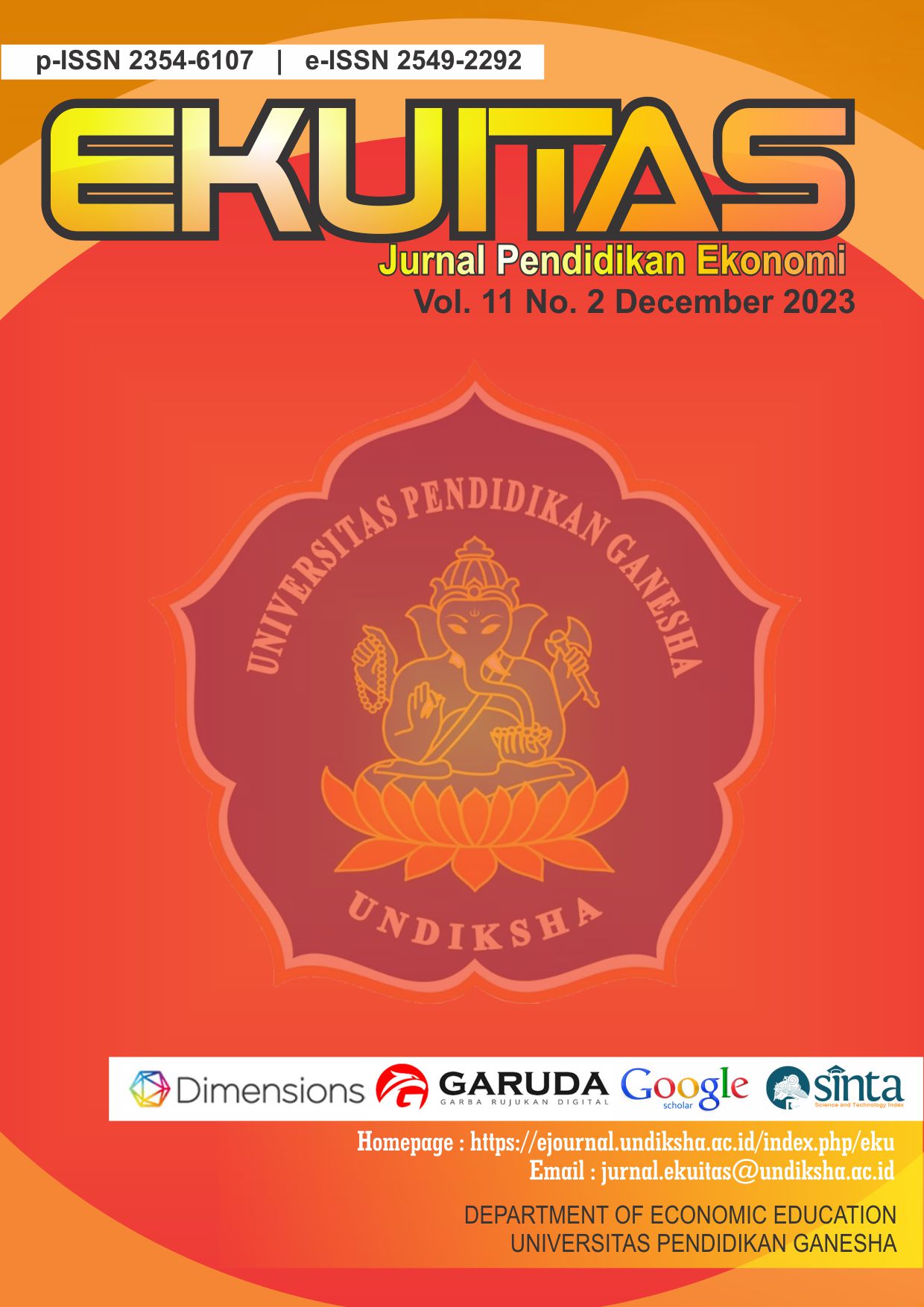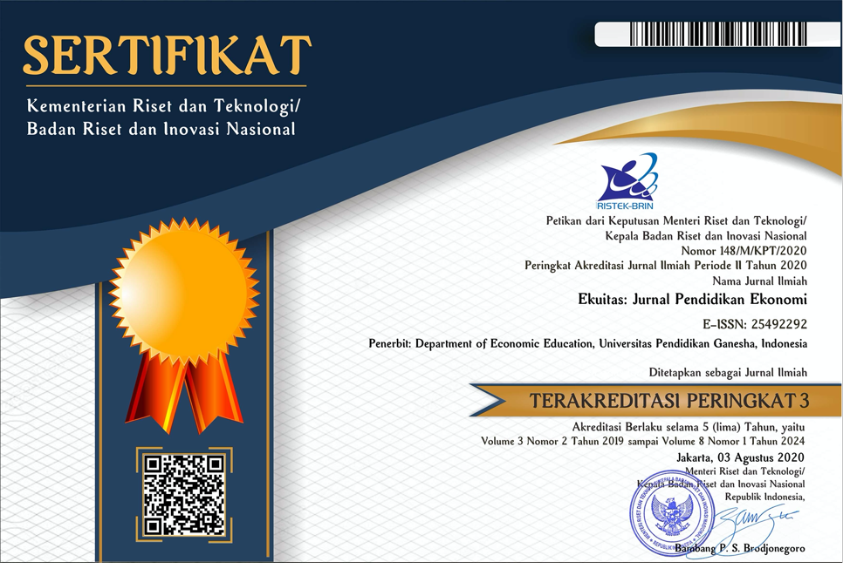Determinasi Prinsip Ekonomi Kerthi Bali Pada Sektor UMKM di Desa Nagasepaha Kabupaten Buleleng
DOI:
https://doi.org/10.23887/ekuitas.v11i2.69201Keywords:
Kerthi bali economy, micro small and medium enterprisesAbstract
The improvement of the regional economy, especially the village of Nagasepaha at this time, is an interesting thing to study. The characteristic of Nagasepaha village which is the identity is the glass puppet craft and saab mote. The covid 19 pandemic had a very significant impact on the community because many were laid off. The people of Nagasepaha village tend to work in the tourism sector rather than working as craftsmen. In order for the economy of Nagasepaha village to recover, one of the efforts made is through the determination of the kerthi bali economy. The hope of implementing the concept of the kerthi bali economy in the MSME sector is to be able to grow the village economy and create a balance in the aspects of parahyangan, pawongan and palemahan.The method used is descriptive quantitative aims to create a picture or description of a situation objectively using numbers, starting from data collection, interpretation of data, and appearance and results. This research is used to describe the characteristics of the Kerthi Bali economy, especially in the MSME sector in Nagasepaha Village. In this method, researchers will use data in the form of numbers generated from surveys, observations, or other data sources to explain in depth about the economic conditions of Kerthi Bali, especially in the MSME sector in Nagasepaha Village. The results showed that of the 11 principles outlined in the Kerthi Bali economic concept, there are 2 principles that have not been maximally understood and applied, namely the 3rd principle relating to the economy built / developed by Krama Bali inclusively, creatively, and innovatively. And the 7th principle relating to the economy that is built / developed by accommodating the application / development of science and technology and digital technology. Furthermore, the level of implementation of the principles of the Balinese kerthi economy of MSME players in Nagasepaha Village, Buleleng Regency found that of the 11 principles used as measuring instruments showed that in general it scored 0.35 in the Good category.
References
Arta, I. P., & Sukendri, N. (2020). Pemberdayaan Ekonomi Umat Hindu Melalui Peningkatan Kemampuan Kewirausahaan di Banjar Tresna Astiti Karya Kabupaten Lombok Barat. Pepadu, 1(1).
Azizah, S. N., & Muhfiatun. (2017). Pengembangan Ekonomi Kreatif Berbasis Kearifan Lokal Pandanus Handicraft dalam Menghadapi Pasar Modern Perspektif Ekonomi Syariah (Study Case di Pandanus Nusa Sambisari Yogyakarta). APLIKASIA: Jurnal Aplikasi Ilmu-ilmu Agama, 17(2).
Kadeni, & Srijani, N. (2020). Peran UMKM (Usaha Mikro Kecil Menengah) dalam Meningkatkan Kesejahteraan Masyarakat. Equilibrium, 8(2).
Karyada, I. P., & dkk. (2022). Ekonomi Kerthi Bali: Paradigma Berbasis Kearifan Lokal. Dharma Smrti: Jurnal Ilmu Agama Dan Kebudayaan, 22(2).
Koster, W. (2022). Menyeimbangkan Struktur dan Fundamental Perekonomian Bali – Wujudkan Bali Berdikari Bidang Ekonomi. Bangkitkan Baliku. Denpasar: Universitas Hindu Indonesia.
Miles, M. B., & Huberman,, A. H. (2014). Analisis Data Kualitatif. Jakarta: UI Press.
Sadguna, I. G. (2022). Prinsip-Prinsip Pembangunan Ekonomi Kerthi Bali. Beda Prinsip Ekonomi Kerthi Bali. Denpasar: Universitas Hindu Indonesia.
Sudijono, A. (2012). Pengantar statistik Pendidikan. Bandung: Rajawali Pers.
Sugiyono. (2022). Metode Penelitian Kuantitatif, Kualitatif, dan R&B. Bandung: Alfabeta.
Wiana, K. (2018). Sad Kerthi: Sastra Agama, Filosofi, dan Aktualisasinya. Bali Membangun Bali: Jurnal Bappeda Litbang, 159-179.
Wibawa, Budhi, & et. al. (2010). Dasar-dasar Pekerjaan Sosial. Bandung: Widya Padjadjaran.
Wulandari, S., & Widowati, A. (2023). Implementasi Program SIPELANDUKILAT dalam Meningkatkan Pelayanan Publik di Wilayah Perbatasan dan Pedalaman (Studi Kasus di Kabupaten Nunukan Provinsi Kalimantan Utara). Jurnal Kebijakan
Pemerintah, 6(1).
Downloads
Published
How to Cite
Issue
Section
License

This work is licensed under a Creative Commons Attribution-ShareAlike 4.0 International License.








